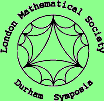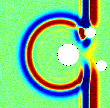 |
|
| Home | |
| Programme | |
| Short Courses | |
| Talks | |
| Posters | |
| Participants | |
| Travel | |

|
LMS Durham Symposium
Computational methods for wave propagation in direct scattering
15-25 July 2002, Durham, UK
LMS Durham Symposia
The London Mathematical Society Durham Research Symposia began in 1974 and have now become an established series of international research meetings, with over 60 symposia to date. The aim is to provide an opportunity to explore an area of research in depth, to learn of new developments, and to instigate links between different branches. The format is designed to allow substantial time for interaction and research, and the meetings usually have up to 70 participants. This meeting has obtained substantial support from the UK Engineering and Physical Sciences Research Council (EPSRC).Click here for details of previous and future LMS Symposia.
Main topics of this symposium
Methods for frequency domain and time domain PDEs and BIEs; fast methods; absorbing boundary conditions; relationship with inverse problems; discussion of ``best'' strategies for particular problems.

Organisation
| Scientific: |
Mark Ainsworth
(Strathclyde, UK); Penny J Davies (Strathclyde, UK); Dugald B Duncan (Heriot-Watt, UK); Paul A Martin (Colorado School of Mines, USA); Bryan P Rynne (Heriot-Watt, UK). |
|---|---|
| Contact: | Dr Penny J Davies (penny@maths.strath.ac.uk) |
| Local: | Department of Mathematical Sciences at Durham University with accommodation in Grey College. |